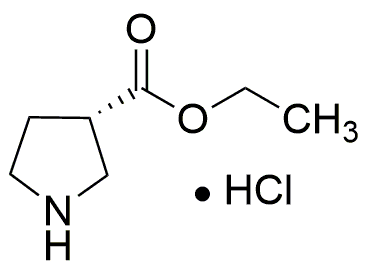Ethyl (S)-pyrrolidine-3-carboxylate hydrochloride is widely utilized in research focused on:
- Pharmaceutical Development: This compound serves as an important intermediate in the synthesis of various pharmaceuticals, particularly those targeting neurological disorders, enhancing drug efficacy and specificity.
- Chiral Synthesis: Its chiral nature makes it valuable in asymmetric synthesis, allowing researchers to create enantiomerically pure compounds, which are crucial in developing effective drugs with fewer side effects.
- Biochemical Research: It is employed in studies related to enzyme activity and metabolic pathways, helping scientists understand biological processes and develop new therapeutic strategies.
- Material Science: The compound can be used in the formulation of polymers and other materials, providing unique properties such as improved stability and performance in various applications.
- Agricultural Chemistry: It has potential applications in developing agrochemicals, contributing to more effective pest control solutions that are environmentally friendly and sustainable.
Informations générales
Propriétés
Sécurité et réglementation
Applications
Ethyl (S)-pyrrolidine-3-carboxylate hydrochloride is widely utilized in research focused on:
- Pharmaceutical Development: This compound serves as an important intermediate in the synthesis of various pharmaceuticals, particularly those targeting neurological disorders, enhancing drug efficacy and specificity.
- Chiral Synthesis: Its chiral nature makes it valuable in asymmetric synthesis, allowing researchers to create enantiomerically pure compounds, which are crucial in developing effective drugs with fewer side effects.
- Biochemical Research: It is employed in studies related to enzyme activity and metabolic pathways, helping scientists understand biological processes and develop new therapeutic strategies.
- Material Science: The compound can be used in the formulation of polymers and other materials, providing unique properties such as improved stability and performance in various applications.
- Agricultural Chemistry: It has potential applications in developing agrochemicals, contributing to more effective pest control solutions that are environmentally friendly and sustainable.
Documents
Fiches de données de sécurité (FDS)
La FDS fournit des informations de sécurité complètes sur la manipulation, le stockage et l’élimination du produit.
Spécifications du produit (PS)
Le PS fournit une description complète des propriétés du produit, notamment sa composition chimique, son état physique, sa pureté et les exigences de stockage. Il détaille également les plages de qualité acceptables et les applications prévues du produit.
Certificats d'analyse (COA)
Recherchez des certificats d'analyse (COA) en saisissant le numéro de lot du produit. Les numéros de lot et de lot se trouvent sur l'étiquette d'un produit, après les mots « Lot » ou « Lot de fabrication ».
Numéro de catalogue
Numéro de lot/série
Certificats d'origine (COO)
Ce certificat d'exploitation confirme le pays dans lequel le produit a été fabriqué, et détaille également les matériaux et composants utilisés et s'il est issu de sources naturelles, synthétiques ou autres sources spécifiques. Ce certificat peut être requis pour les douanes, le commerce et la conformité réglementaire.
Numéro de catalogue
Numéro de lot/série
Fiches de données de sécurité (FDS)
La FDS fournit des informations de sécurité complètes sur la manipulation, le stockage et l’élimination du produit.
DownloadSpécifications du produit (PS)
Le PS fournit une description complète des propriétés du produit, notamment sa composition chimique, son état physique, sa pureté et les exigences de stockage. Il détaille également les plages de qualité acceptables et les applications prévues du produit.
DownloadCertificats d'analyse (COA)
Recherchez des certificats d'analyse (COA) en saisissant le numéro de lot du produit. Les numéros de lot et de lot se trouvent sur l'étiquette d'un produit, après les mots « Lot » ou « Lot de fabrication ».
Numéro de catalogue
Numéro de lot/série
Certificats d'origine (COO)
Ce certificat d'exploitation confirme le pays dans lequel le produit a été fabriqué, et détaille également les matériaux et composants utilisés et s'il est issu de sources naturelles, synthétiques ou autres sources spécifiques. Ce certificat peut être requis pour les douanes, le commerce et la conformité réglementaire.


